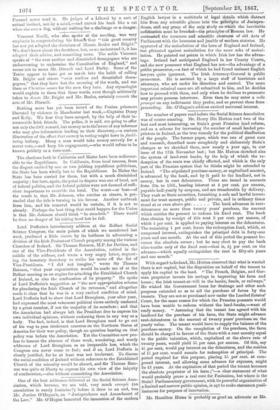Lord Dufferin's introductory address at the Belfast Social Science Congress,
the main points of which we mentioned last week, produced a little emeute by its boldness in advocating a division of the Irish Protestant Church property among the various Churches of Ireland. Sir Thomas Bateson, M.P. for Devizes, and one of the Vice-Presidents of the Association, retired in the middle of the address, and wrote a very angry letter, request- ing the honorary Secretary to strike his name off the list of Vice-Presidents. "I did not imagine," wrote Sir Thomas Bateson, "that your organization would be made use of at the Belfast meeting as an engine for attacking the Established Church of Ireland, as also the confiscation of its property." He spoke of Lord Dufferin's suggestion as "the new appropriation scheme for plundering the Irish Church of its revenues," and altogether made it clear that he was in a very excited condition of mind. Lord Dufferin had to show that Lord Brougham, year after year, had expressed the most vehement political views entirely unshared by a great number, if not the majority of its members ; and that the Association had always left the President free to express his own individual opinions, without endorsing them in any way as a body. The fact, indeed, is that Lord Brougham used to go out of his way to pass irrelevant censures on the Northern States of America for their war policy, though no question bearing on that policy was before the Association. Yet the Committee now pro- fess to lament the absence of those weak, wandering, and wordy addresses of Lord Brougham as an irreparable loss, which the Congress can never cease to feel ; and if so, Lord Dufferin is clearly justified, for he at least was not irrelevant. To discuss the social condition of Ireland without reference to the Established Church of the minority would be absurd, and Sir Thomas Bate- son was quite at liberty to express his own view of the iniquity of confiscation,—also without committing the Association.






























 Previous page
Previous page